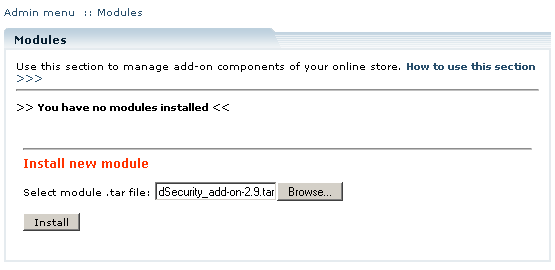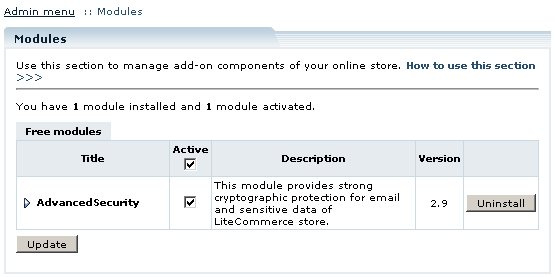LiteCommerce:AdvancedSecurity
Contents
Introduction
LiteCommerce Advanced Security add-on module is highly recommended for the shop owners who are going to store credit card numbers in the database or include them in email notifications. The module supports strong encryption of credit card numbers and email messages with Gnu Privacy Guard (GnuPG) technology.
GnuPG encrypts information using asymmetric keypairs individually generated by GnuPG users. Each pair consists of a private key and a public key. Information encrypted using the private key can be decrypted by using the public key and vice versa. For more information go to GnuPG home page: http://www.gnupg.org.
Once the add-on is installed, properly configured and encryption is enabled neither unauthorized database access nor intercepted email messages with sensitive data would cause any security problems. To access the encrypted data from the admin menu a private key password is required.
Gnu Privacy Guard is freeware encryption software not included in Advanced Security package. GnuPG v1.2.3 or newer needs to be installed on your system in order for the add-on to work. Please visit GnuPG download page to choose a package for your platform.
To make working with GnuPG easier, many special applications can be used. One of the most comprehensive is Gpg4win. Gpg4win is an installer package for Windows (95/98/ME/2000/XP/2003) with computer programs and handbooks for email and file encryption. Gpg4win and the software included with Gpg4win are Free Software. The package may consist of several applications, including:
- GnuPG: The core; this is the actual encryption tool
- WinPT: A key manager and helper for various encryption matters. The documentation can be found here: http://encoderx.eu/security/winpt.php
- GPA: Another key manager
- GPGol: A plugin for Microsoft Outlook 2003 (email encryption)
- GPGee: A plugin for Microsoft Explorer (file encryption)
- Sylpheed-Claws: A complete email program including the plugin for GnuPG
GnuPG software for Mac OS X can be found at http://macgpg.sourceforge.net.
Installing the Module
To successfully install Advanced Security add-on module your shopping system requires LiteCommerce shopping cart software version 2.x to be installed at your online store.
Select the 'Modules' section in the 'Settings' menu of the Administrator Zone. The list of currently installed modules will appear. To install a module (Advanced Security in our case) click on the 'Browse…' button, select the module's '.tar' file and click on the 'Install' button to add the module to your store setup.
'Advanced Security' module will appear in the list of the installed modules; it will be activated automatically.
To deactivate the module, unselect the 'Active' check box against the module title and click on the 'Update' button. To completely uninstall the module, click on the 'Uninstall' button.
Generating keys
First, you need to create your keys. There is a number of desktop applications, which make the process simple and easy. For example, software for Windows called WinPT. For information about WinPT, installation, use and key generation visit http://winpt.sourceforge.net/en/.
Here is what the process of generating keys might look like if you are using a command-line version of GnuPG. In our example we are using a fake name and email address - John Smith <john_smith@example.com>:
1. Start key generation:
gpg --gen-key
2. Select the key types you want - The default is good.
Please select what kind of key you want:
(1) DSA and ElGamal (default) (2) DSA (sign only) (4) ElGamal (sign and encrypt) Your selection? 1
3. Select your key size:
DSA keypair will have 1024 bits. ELG-E keys may be between 1024 and 2048 bits long. What keysize do you want? (2048) Requested keysize is 2048 bits
4. Set the lifetime of this key:
Please specify how long the key should be valid. 0 = key does not expire <n> = key expires in n days <n>w = key expires in n weeks <n>m = key expires in n months <n>y = key expires in n years Key is valid for? (0) 1m Key expires at Fri Jun 10 14:39:04 2005 MSD Is this correct (y/n)? y
5. Enter your name and email address(es)...
Real name: John Smith <return> Email address: john_smith@example.com<return> Comment: You selected this USER-ID: "John Smith <john_smith@example.com>" Change (N)ame, (C)omment, (E)mail or (O)kay/(Q)uit? O
6. Choose a passphrase. It should be long and very difficult to guess. It should be something you won't forget. If you forget your passphrase, you cannot recover your key.
After you have generated your public and secret keys, go to Advanced Security configuration page.

